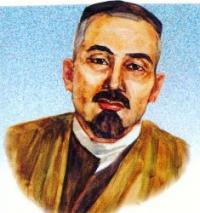You are here
Ikylasa Dukenova cult-memorial complex.

Alternative Kazakhstan tours.
“...it seemed a part of her life, to step from the ancient to the modern, back and forth. She felt rather sorry for those who knew only one and not the other. It was better, she thought, to be able to select from the whole menu of human achievements than to be bound within one narrow range”
Orson Scott Card.
Visiting monuments in the Zhambyl region.
The cult-memorial complex was erected in 1993 to mark the 150th anniversary of the national composer kyusha over a symbolic burial with a buried handful of earth from his grave. The complex is located 925 meters south-west of the village of Saudakent in the Sarysu district of Zhambyl region.
Ykylas (Ihlas) Dukenulov (Dukenuly) (- Kazakh folk composer-kyushi, kobyzist, one of the founders of the kobyz school. Ykylas came from the Kazakh genus Zhetyru (Younger zhuz), a subgenus of tama, inside of tama - jogi.
He was born in a creative family: his Altynbek’s grandfather was a skilled jeweler, blacksmith, made musical instruments, played them, Duken’s father was known as a kyushi virtuoso. Therefore, since childhood, Ykylas absorbed the motives of oral creativity (zhyr, legends, fairy tales, kyssa), he early defined himself as a musician - from 7 - 8 years old knew how to perform father's cui, at 15 years old a ledge An unusual talent of the young man was noted by the famous akyns Zhanak Sagyndykuly and Shozhe Karzhaubayuly, the well-known Tattimbet Kazangap-ouly and Tok Shonman-ouly appreciated his musical performance skills.
Them to the heights of the classical form, then he began to fight for the purity and clarity of the sound of kobyz According to A.K. Zhubanov, he “was the first to snatch the kobyz from the hands of a buck and put this wonderful folk instrument with a human voice at the service of the new life of the people."
Performing works of oral folklore on kyl-kobyz, Ykylas simultaneously developed and deepened the sound complex of this instrument. His first original cuys are closely related to the intonations of musical folklore.
Among other musical works, they are notable for their unusual tempo, rhythmic construction, versatility of the thematic range, and ideological content. He owns the cuys of heroic-epic, philosophical and lyrical plan (“Kertolgau”, “Konyr”, “Ykylas”, “Kazan”, “Kambar-Nazym”, “Zhezkiik”, “Akku”, “Shynyrau”, “Zhalgyz Ayak” ), social-civil, satirical kui, making fun of volost governors, representatives of the tsarist government ("Erden", "Hot Pats", "Bestore" and others).
In the cities of Omsk, Petropavlovsk, Akmolinsk, at fairs where Ikylas visited, he did not find his equal in playing kobyz. His students were famous masters of folk art Sugir Aliuly, Ashay, Aiken, the son of Ykylas - Tusupbek also masterfully played kobyz, taught his father D. Myktybaev to the kyyam.
In Almaty, the building of the Museum of Folk Musical Instruments is named after Ykylas Dukenov. In Taraz, every two years, a republican contest of performers on the kobyz “Zhez kіyk” is held, dedicated to the memory of Ykylas.
Competitions are opened by playing one of his descendants on the kobyz of Ykylas himself. In Astana, a street is named after Ykylas Dukenula.
Authority:
Alexander Petrov. Wikipedia
Photo
Alexander Petrov.







